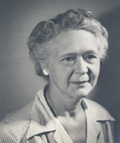Mildred Trotter
| Interviewer: |
Estelle Brodman |
 |
| Date: |
May 19, 1972 and May 23, 1972 |
| Identifier: |
OH009 and OH010 |
| Approximate Length: |
37 leaves (96 min.) |
| Biographical Information: |
Anatomist and anthropologist, 1899-1991. After receiving a bachelor’s degree from Mt. Holyoke College in 1920, Trotter came to Washington University where she completed a master’s degree in Anatomy in 1921 and a doctorate in Anatomy in 1924. Trotter served on the faculty in the department of Anatomy of the Washington University School of Medicine from 1922 until her retirement as professor emerita and lecturer in 1967, though she continued her research and writing until 1984. In 1946, Trotter became the first woman to achieve the rank of professor in the university’s School of Medicine. |
| Summary: |
Trotter discusses her interest in anatomy and the events leading her to joining the faculty of the Washington University School of Medicine department of Anatomy. She recounts several events in the history of the department and its heads over the years, including Robert J. Terry, Edmund V. Cowdry, and Edward Dempsey. Trotter describes serving as an anthropologist in Hawaii identifying skeletal remains after the Second World War, changes in the study and teaching of anatomy, and teaching for a year at Makerere University College in Kampala, Uganda. She also discusses changes in the Washington University School of Medicine over the course of her career as well as sex discrimination in salaries and promotion at the university. |
| Notes: |
The transcript combines two conversations between Mildred Trotter and Estelle Brodman recorded in May, 1972. The transcript was edited in 1985 by Paul G. Anderson to present events of Dr. Trotter's life in chronological order. Emendations of Dr. Trotter's remarks are indicated by words or passages enclosed in brackets. The audio quality of the original sound recording is poor. |
Please note: The Becker Medical Library presents this oral history interview as part of the record of the past. This primary historical resource may reflect the attitudes, perspectives, and beliefs of different times and of the interviewee. The Becker Medical Library does not endorse the views expressed in this interview, which may contain materials offensive to some users.
|

